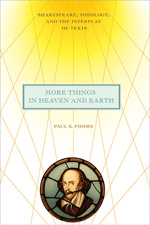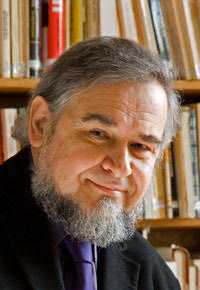Today, we are happy to bring you our conversation with Paul S. Fiddes, author of MORE THINGS IN HEAVEN AND EARTH: Shakespeare, Theology, and the Interplay of Texts
What inspired you to write this book?
My inspiration to write about Shakespeare began with getting drunk on the words of Anthony and Cleopatra in Shakespeare’s play of that name when I studied it my Grammar (High) School – ‘Then must thou needs find out new heaven, new earth’ ... ‘I am marble constant. The fleeting moon no planet is of mine’. The urge to write was deepened by seasons spent in the audience of the Royal Shakespeare Theatre at Stratford-upon-Avon over the last 50 years, as well as by many happy encounters with students who found that Shakespeare spoke to them in their own time. The final inspiration came when I realised that Shakespeare lies at the very centre of my life-long fascination with the relationship between theology and creative literature.
What did you learn and what are you hoping readers will learn from your book?
I always knew that Shakespeare was familiar with the Bible, but I became even more aware of just how many quotations and echoes of scripture there are in every play. I discovered how Shakespeare is able to use this first-hand knowledge of the scriptural text to shape his making of poetry and drama, and to develop a spirituality which is quite free of dogma and any confessional constraints. I hope that readers will learn from this universal spirituality, whatever their own religious convictions or lack of them, and will be helped to practice it by living in the world of the plays. For me, it was also important to learn more about answering the question: ‘How can we do theology today?’
What surprised you the most in the process of writing your book?
I was surprised to find just how many different cultures of Shakespeare’s own time are reflected in his plays, whether this be different cultural and religious groups in the English nations or further abroad. It was also a pleasant surprise to find Shakespeare read and appreciated in a wide variety of cultures in our time.
What’s your favorite anecdote from your book?
My favourite anecdote is the entry in Samuel Pepys’ diary for September 1662, in which he records a visit to the theatre: “[I] went to the Kings Theatre, where we saw Midsummer Night’s Dream, which I have never seen before, nor ever shall again, for it is the most insipid ridiculous play that ever I saw in my life. I saw, I confess, some good dancing and some handsome women, which was all my pleasure.” It’s fairly clear what gets Pepys’ attention!
What’s next?
My next research project is to complete a long-standing commission to write a commentary on the Apostle Paul’s Epistle to the Romans, concentrating on the impact that the text of Romans has had on civilizations of East and West over the years, not only on the Christian church but on wider society and especially on its creative arts. You can be sure that plays of Shakespeare will play a significant part in giving an account of this influence of Paul’s letter on culture.





